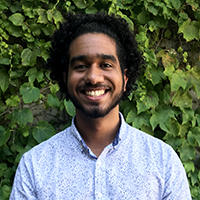By Amaury V. Miniño
The following is a summary of the daily journal I am keeping during my participation in the summer school on “Dynamics and Data in the COVID 19 Pandemic,” which is sponsored by the American Institute of Mathematics (AIM) and the Mathematics and Climate Research Network (MCRN). This piece is separate from Hans Kaper’s (Georgetown University) daily blog.
I will begin by reaffirming the responsibility of mathematicians in times of crisis. During these tumultuous times, society looks to us for answers, tools, and ultimately ways to regain control over what has been lost. The program of this particular summer school focuses on the disastrous COVID-19 pandemic, which has claimed countless lives and economically devasted many communities. Due to the incremental nature of mathematics, it is unlikely that any one project that develops from this program will immediately end the pandemic and lead to global restoration. However, every step brings about invaluable knowledge, the cumulation of which will (hopefully) help the world.
At the beginning of the week, I was unsure of what to expect. The program felt much less structured than what I am used to — a combination of the topic’s recency and the institute atmosphere. The past five days emphasized team building and group connections. Much of our time was spent in meta conversations about our group dynamics, the specific expertise we felt we could bring to the team, etc. All of this left me feeling connected to everyone and made me more comfortable with the online setting. Nevertheless, it does not compare to the advantage of an on-site program. Face- to-face interactions have value, and that type of interaction is difficult to recreate virtually. There is also a loss of rest when programs take place online. For example, inherent lulls occur in on-site programs when participants walk from room to room, grab coffee, and pace around the building. All of these activities are absent from a virtual format, and it becomes easier to fill this time with additional work. Our conversations during the summer school addressed this issue, and our current working solution is to hold intermittent breaks throughout the day. Downtime will continue to be a challenge that all virtual conferences face, and I hope that potential solutions are tested and shared.
The theme of the AIM/MCRN summer school’s first week was “Questions.” We spent much of our time receiving an overview of mathematical biology and talking to experts in the field about critical questions that require answers. Many activities focused on some aspect of current research—generally a paper—and encouraged us to develop relevant queries based on that information. This process provided me with a better idea of the type of work we will be doing in the coming weeks, but I am still unsure of how the mathematics will look. However, I imagine that the activities of the past week will likely help keep our research more focused, and I will be sure to reflect on this structure at the end of the program.
My current research interest lies with the actual modeling. While data is interesting, and our conversations regarding its collection/use have certainly been exciting, I find a greater sense of familiarity and fascination with the models that are currently driving the world. The theme of the second week is “Modeling,” so I will soon have a chance to examine the mathematics that interest me most. It seems like we may focus on network-based models, as we have discussed various papers about this type of modeling. I find this particularly exciting because of my previous work with networks, albeit within the scope of game theory. I hope my expectations are accurate and that the forthcoming week is more rigorous than the last.
Overall, I found the first week of the summer school productive. While there was a noticeable lack of mathematics, it did build a solid foundation for participants. My impression from the weekend reading is that we will soon face more mathematics and begin asking more directed questions that demand the use of math. I look forward to continuing with the program.
 |
Amaury V. Miniño is a Dominican mathematician who is pursuing his Ph.D. in mathematics at Colorado State University. |